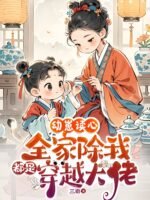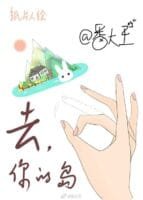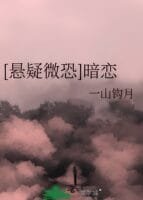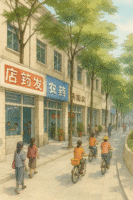I Have A Store C06
by MarineTLChapter 6: The Misunderstanding Resolved
Zhoujiazhuang was a village where almost everyone had the surname Zhou. As the saying goes, “even if bones are broken, the tendons are still connected”—most families were related in some way or another.
For instance, Zhou Yimin and the family of the old village secretary were technically related, though distantly. They were beyond the five degrees of mourning relations, meaning they weren’t closely related.
In traditional Chinese kinship, five degrees of mourning (五服) refer to five generations of relatives: great-great-grandparents’ generation, great-grandparents’ generation, grandparents’ generation, parents’ generation, and one’s own generation, including siblings.
In other words, if someone is in the same generation as you but does not share the same great-great-grandparent, they are considered outside the five degrees of mourning.
Beyond five generations, mourning obligations ceased, a practice known as “out of mourning” (出服) or “beyond five degrees of mourning” (出五服).
Historically, the term “five degrees of mourning” initially referred to five levels of official mourning attire worn by emperors, nobles, officials, and scholars. Later, in common society, it became a measure of kinship distance, determining mourning customs.
Many people might not be aware of this.
—
Soon, the people of Zhoujiazhuang arrived at Shangshui Village, and the two villages faced off.
At first, they tried reasoning things out.
However, to their surprise, Shangshui Village also had grievances—because their section of the river had dried up as well!
“See for yourselves!” The village chief of Shangshui Village spoke bluntly.
This time, the people of Zhoujiazhuang were dumbfounded.
It wasn’t that there was no water at all, but it was very little. Even if Shangshui Village stopped using it completely, there was no guarantee that the water would reach Zhoujiazhuang.
For a while, both villages were troubled, and the atmosphere grew heavy. If this continued, the grain harvest would drastically decrease, and starvation could become a real threat.
The Shangshui Village chief took a drag from his dry tobacco pipe and asked the old village secretary of Zhoujiazhuang, “Old Zhou, does your village still have grain? Could you share some with us and wait until—”
Before he could finish, the old village secretary interrupted, “We can’t last much longer either. I was thinking of borrowing some from your village!”
Well, that settled it.
Two villages in the same desperate situation.
With the misunderstanding resolved, the old village secretary led his people back to Zhoujiazhuang. The water shortage remained a pressing issue. Zhoujiazhuang still had a natural spring, which the villagers had been using for drinking water since their wells had dried up.
Now, it seemed they would have to use the spring for irrigation, which meant restricting household water usage. Zhou Xuqiang’s plan to fetch a few extra buckets of water today was now impossible.
“Third Uncle, it’s fine! I’ll just take another bath when I go back to the city,” Zhou Yimin said.
The entire village was facing the same hardship—he couldn’t make an exception for himself.
However, for the sake of his grandparents’ comfort, Zhou Yimin had an idea: a hand-operated water pump. If he could set one up near the house, fetching water would become much easier.
Despite the drought, the groundwater remained abundant and largely untapped. Under such conditions, drilling about ten meters deep in the right spot could yield water.
Unlike in later years, where excessive groundwater usage caused levels to drop drastically—sometimes requiring drilling over a hundred meters into bedrock—this era still had plenty of accessible underground water.
A hand-operated water pump had a simple structure and could draw water from depths of up to ten meters.
Zhou Yimin’s old home had one in his previous life, so he was familiar with it. The technology wasn’t complicated.
The pump only required a few key components. For most people, obtaining these might be difficult, but for him—working in a steel factory—it wasn’t hard to find an experienced craftsman to forge the parts. It wasn’t like he was building an airplane or a cannon.
With this in mind, he was eager to return to the steel factory.
“Yimin, you head back first. I’ll stay and look around a bit more,” Zhou Xuqiang said, unwilling to give up just yet.
Zhou Yimin, deep in thought about the water pump, paid him no mind. Upon returning to his grandmother’s house, he immediately started sketching the pump parts on paper. Aside from the pump itself, he also needed a drill rod for the well.
His grandparents noticed him writing and drawing but didn’t disturb him. They even shooed away Laifu and the other kids to let him concentrate.
By evening, Zhou Yimin had completed the blueprints.
Just then, his third uncle returned with water.
“I thought each household was supposed to take a limited amount now?” Zhou Yimin asked in surprise.
Zhou Xuqiang grinned slyly. “The old village secretary knew it was for your family, so he didn’t stop me.”
Not only did the village secretary turn a blind eye, but the other villagers also had no objections. After all, their children had benefited from Zhou Yimin’s generosity before—what was a few extra buckets of water in return?
Zhou Yimin shook his head slightly. “Once or twice is fine, but don’t make it a habit. It’ll cause resentment.”
His grandfather agreed, saying, “Yimin is right. Starting tomorrow, we’ll follow the village’s regulations.”
Especially in tough times, fairness was crucial. If exceptions were made, it would be hard for the village to stay united and get through the crisis together.
Seeing both Yimin and the old man insist, Zhou Xuqiang didn’t argue. Instead, he felt relieved. The villagers might not have said anything openly, but who knew what they really thought?
“The old village secretary plans to gather a group to go into the mountains tomorrow,” Zhou Xuqiang changed the subject.
Zhou Yimin wasn’t surprised—he had anticipated this.
For many transmigrators, hunting or fishing and conveniently running into retired high-ranking officials seemed like a common trope. But for Zhou Yimin, that was unnecessary. Whether hunting or fishing, the goal was simply to secure resources.
He had his system’s shop, a golden cheat. As long as he had money, he wouldn’t lack supplies. There was no need to go through all that trouble.
As for sneaking around on the black market, he figured he’d probably do some smuggling eventually. Otherwise, how else would he make money? Relying solely on providing some meat to the steel factory?
That said, safety was the priority.
As for stumbling upon a retired official in the mountains? How likely was that, really? That kind of coincidence was just ridiculous.
“Mm, makes sense to go find some food in the mountains,” Grandpa Zhou said matter-of-factly.
As the saying goes, “those who live near the mountains rely on the mountains, and those by the sea rely on the sea.”
When the crops in the fields weren’t enough to eat, not seeking food from the mountains would be foolish. Rather than starving, it was better to take the risk.
That night, they ate meat, but Zhou Yimin didn’t eat much—it simply wasn’t tasty.
Without proper seasoning, the meat was either boiled with some salt or stir-fried. How good could it possibly taste?
His grandparents thought he was intentionally letting them eat more and were touched by his “sacrifice.” Grandma Zhou kept piling meat onto his plate, leaving him helpless.
Laifu, Laicai, and Laifang had likely been warned by their mother beforehand—they only took three pieces each before stopping.
Still, they felt incredibly lucky. After all, they were the only ones in the entire village who got to eat meat.
The next morning, when Zhou Yimin woke up, he found that his grandmother had made steamed buns and boiled eggs for him.
His grandparents had also eaten—but they had eaten cornbread instead, making sure to wake up early so he wouldn’t see.
Although Yimin had brought home plenty of food, they wanted to save it all for him, content with eating simple meals themselves.
Noticing the cornbread crumbs, Zhou Yimin “got angry” and “threatened” them: “Grandma, if you eat cornbread again, I won’t come back anymore.”
Caught red-handed, Grandma Zhou quickly promised, “Alright! No more cornbread. Later, I’ll have your aunt take it back to her house.”
If they really made their precious grandson upset and he stopped visiting, they would be heartbroken.
“Big Brother! Big Brother!”
Laifu and the others ran inside but, seeing that he was still eating breakfast, obediently stepped back outside.
(End of Chapter)










0 Comments